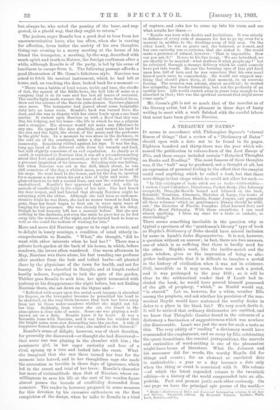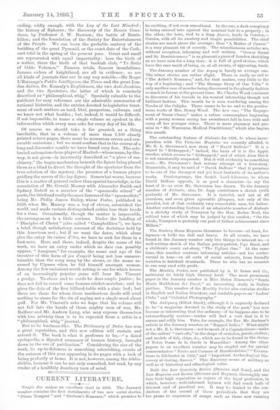A. TREASURY OF DATES.*
IT seems in accordance with Philosopher Square's "eternal fitness of things" that a review of a ":Dictionary of Dates" should open with a date not to be found in its pages.
Eighteen hundred and thirty-three was the year which wit- nessed the publication in volume-form of the Last Essays of Elia, and these essays included certain "Detached Thoughts on Books and Reading." The most famous of these thoughts
was, if the "bull" may be pardoned, not a thought at all, but an expression of personal feeling to the effect that the essayist
could read anything which he called a book, but that there were things in that shape which he could not allow for such :— " In this catalogue of books which are no books—bibZia-abiblia- I reckon Court Calendars, Directories, Pocket-Books (the Literary excepted), Draught-Boards bound and lettered on the back, Scientific Treatises, Almanacs, Statutes at Large, the works of Hume, Gibbon, Robertson, Beattie, Soame Jenyns, and generally all those volumes which no gentleman's library should be with- out :' the histories of Flavius Josephus (that learned Jow) and Paley's Moral Philosophy. With those exceptions, I can read almost anything. I bless my stars for a taste so catholic, so unexcludin,g."
There seems something inevitable in the question why so typical a specimen of the "gentleman's library" type of book
as Haydn's Dictionary of Dates should have missed inclusion by name in Lamb's Index Expurgatorius. It is not, however, a question without an answer ; in fact, there are two answers, one of which is so sufficing that there is hardly need for the other. Haydn's work, like the lucifer-match and the glass window, gives us the impression of being so alto- gether indispensable that it is difficult to imagine a period in the history of civilisation when it was not in existence. Still, incredible as it may seem, there was such a period, and it was prolonged to the year 1841; so it will be clear to the arithmetical reader that if Lamb had in-
cluded the book, he would have proved himself possessed of the gift of prophecy, "which," as Euclid would say, "is absurd." Let us, however, for a whim, number Ella among the prophets, and ask whether his prevision of the non- musical Haydn would have sentenced the worthy dealer in dates to a place in the black list? We very much doubt it.
It will be noticed that ordinary dictionaries are omitted, and we know that Thtsaphile Gautier found in the columns of a
dictionary a fascination of suggestiveness which was nowhere else discoverable. Lamb was just the man for such a taste as this. The very oddity of" reading" a dictionary would have commended the employment, and an essay by Ella celebrating the queer transitions, the comical juxtapositions, the marvels and curiosities of word-making is one of the pleasantest might-have-beens of literature. What Dr. Johnson and his successor did for words, the worthy Haydn did for
things and events ; for an abstract or unrelated date is unthinkable : a year or a day becomes a date only when the thing or event is associated with it. His volume
which the latest expanded reissue is the twentieth edition—is a history of the world compounded into an olla- podrida. Past and present jostle each other curiously. On one page we have the principal epic poems of the world,-
* Haydn's Dictionary of Date, and Univarta/ Tnfortnatton ro7ating to all Agog and Nations. Twentieth edition. By Benjamin Vincent, London Ward, Look, Bowden, and Co.
ending, oddly enough, with the Lay of the Last Minstrel ; the history of Ephesus ; the discovery of the Eozoon Cana- dense, by Professor J. W. Dawson; the battle of Ennis- killen; and the foundation of the Society for Entertainment of the People. We can learn the probable century of the building of the great Pyramid, or the exact date of the Cath- cart trial in the spring of the present year. Great and small are represented with equal impartiality : here the birth of a nation, there the birth of that bookish club, "Ye Sette of Odde Volumes." Famous trials, famous inundations, famous orders of knighthood, are all in evidence : so are all kinds of journals that are in any way notable,—Sir Roger L'Estrange's Public Intelligence, the Times and the great Lon- don dailies, Dr. Kenealy's Englishman, the two Anti.,Taco6ins, and the two Spectators, the latter of which is concisely described as "philosophical, whig." Specially valuable to the publicist for easy reference are the admirable summaries of national histories, and the entries devoted to legislative treat- ment of such matters as land, libel, pauperism, railways, and we know not what besides ; but, indeed, it would be difficult, if not impossible, to name a single volume so opulent in the information which every man asks for every day of his life.
Of course we should take it for granted, as a thing inevitable, that in a volume of more than 1,100 closely printed octavo pages, there must be numerous errors and cen- surable omissions ; but we must confess that in the course of a long and discursive ramble we have found very few. The cele- brated automaton chess-player of Maelzel—whose name, by-the- way, is not given—is incorrectly described as "a piece of ma- chinery," the bogus mechanism beneath the figure being placed there as a blind to divert the thought of the spectator from the true solution of the mystery, the presence of a human player guiding the moves of the lay-figure. Somewhat worse, because this is a matter of general rather than special knowledge, is the association of Mr. Gerald Massey with Alexander Smith and Sydney Dobell as a member of the "spasmodic school" of poets, the third and really the most famous of the " spasmodists " being Mr. Philip James Bailey, whose Festus, published in 1839, when Mr. Massey was a boy of eleven, astonished the world, and made various distinguished critics lose their heads for a time. Occasionally, though the matter is impeccable, the arrangement is a little curious. Under the heading of 4‘ Disciples of Christ" (also called " Campbellites "), we have a brief, though satisfactory, account of the doctrines held by this American sect ; but if we want the dates, which alone give the entry its raison tr(ltre, we have to seek for them in a foot-note. Here and there, indeed, despite the name of the work, we have an entry under which no date can possibly appear, "Anagram," for example, the name and age of the inventor of this form of jeu d'esprit being not lees unaseer- tainable than the song sung by the sirens, or the name as- sumed by Ulysses when he hid himself amongst women. Among the few omissions worth noting, is one for which lovers of an increasingly popular game will _bear Mr. Vincent a grudge. To chess and to cards he does ample justice ; he does not fail to record some famous cricket-matches ; and, he gives the date of the first billiard-table with a slate bed ; but there are those for whom these meritorious deeds will avail nothing to atone for the sin of saying not a single word about golf. For Mr. Vincent's sake we hope that his volume will not fall into the hands of those mighty men of war, Mr. Balfour and Mr. Andrew Lang, who may express themselves with less sobriety than is to be expected from a critic in a “ philosophical, whig " journal.
But to be business-like. The Dictionary of Dates has won a great reputation, and this new edition will sustain and extend it. The book is what it professes to be,—" a dated cyclopmdia, a digested summary of human history, brought down to the eve of publication." Considering the size of the work, its up-to-dateness is something astonishing, events of the autumn of this year appearing in its pages with a look of being perfectly at home. It is not, however, among the biblia-
bedause it can be not only consulted, but read, by any reader of a healthily desultory turn of mind.



































 Previous page
Previous page